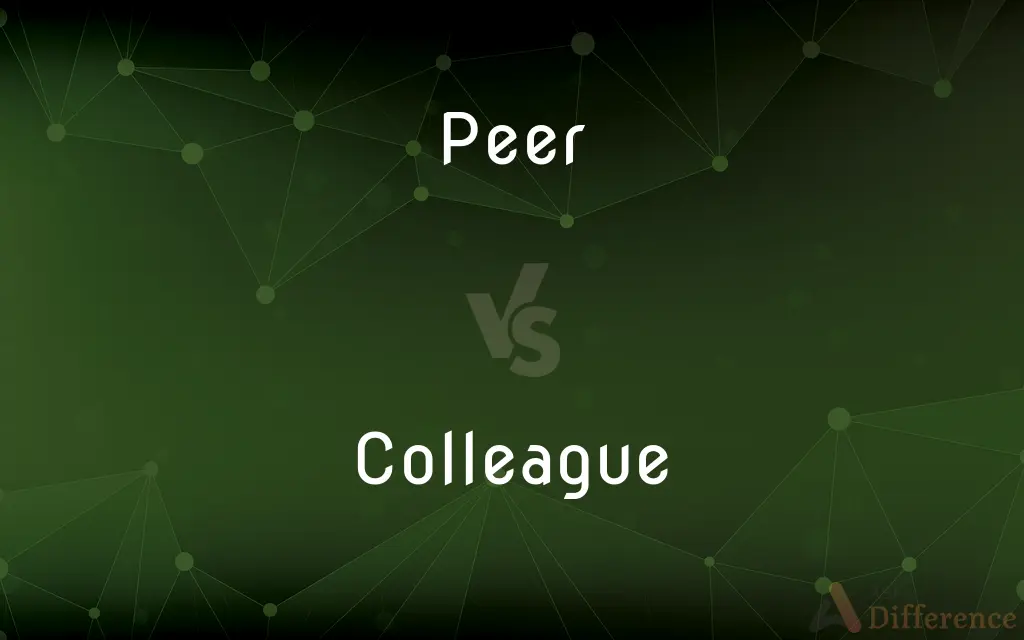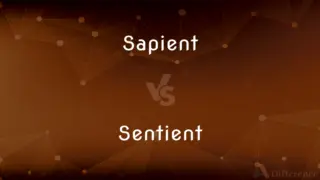Peer vs. Colleague — What's the Difference?
By Tayyaba Rehman — Updated on September 18, 2023
A Peer is an individual considered equal to another in rank, qualification, or age. A Colleague is a co-worker or someone in the same profession.

Difference Between Peer and Colleague
Table of Contents
ADVERTISEMENT
Key Differences
A Peer is someone considered to be on an equal footing with you, either in terms of age, rank, or qualification. On the other hand, a Colleague is more specifically a person with whom you work, generally within the same profession or setting. In essence, all Colleagues may be considered Peers, but not all Peers are Colleagues.
Peers can exist in various aspects of life such as school, community, or even in a social setting. A Peer could be a classmate in school or a neighbor in your community. Colleagues, however, are confined mostly to work or professional settings, such as a co-worker in your office or a fellow researcher in your field.
The term Peer carries a sense of equal standing but doesn’t necessarily imply any sort of relationship beyond that. Colleagues, on the other hand, often have a shared goal or mission because they work together, although they are not always of equal rank.
Both Peers and Colleagues can offer social and emotional support, but the nature and context of the support differ. Peers can provide understanding and shared experiences in various aspects of life. Colleagues often offer more targeted support related to job performance or professional development.
Comparison Chart
Context
Broad (school, social, etc.)
Specific (work, profession)
ADVERTISEMENT
Relationship
May not imply collaboration
Often implies collaboration
Equality
Equal in age, rank, or status
May or may not be equal in rank
Shared Goals
Not necessary
Usually have shared goals
Social Support
General
Professional or job-related
Compare with Definitions
Peer
A Peer is someone of equal rank or qualification.
She viewed him as a Peer because they both held managerial positions.
Colleague
Colleagues often share common goals or missions.
Colleagues in a law firm strive for the firm's success.
Peer
A Peer is someone considered your equal in a certain context.
In academic settings, faculty often view each other as Peers.
Colleague
A Colleague is a co-worker in the same profession or setting.
My Colleague and I are working on a project together.
Peer
Peers can be of the same age group.
Teenagers often seek approval from their Peers.
Colleague
Colleague relationships are generally formal and work-related.
He communicates with his Colleagues mainly through email.
Peer
Peer relationships are not confined to work.
He found his Peers in the gaming community.
Colleague
Colleagues can exist at different ranks within an organization.
The CEO and the manager are Colleagues within the same company.
Peer
To look intently, searchingly, or with difficulty.
Colleague
A fellow member of a profession, staff, or academic faculty; an associate.
Peer
To be partially visible; show
The moon peered from behind dark clouds.
Colleague
A fellow member of a profession, staff, academic faculty or other organization; an associate.
Peer
A person who has equal standing with another or others, as in rank, class, or age
Children who are easily influenced by their peers.
Colleague
To unite or associate with another or with others.
Young Fortinbras,/ Holding a weak supposal of our worth/...Colleagued with the dream of his advantage,/...hath not failed to pester us with message/ Importing the surrender of those lands/Lost by his father. - Hamlet (Act I, Scene 2)
Peer
A nobleman.
Colleague
A partner or associate in some civil or ecclesiastical office or employment. It is never used of partners in trade or manufactures.
Peer
A man who holds a peerage by descent or appointment.
Colleague
To unite or associate with another or with others.
Peer
A computer participating in a peer-to-peer network.
Colleague
An associate you work with
Peer
(Archaic) A companion; a fellow
"To stray away into these forests drear, / Alone, without a peer" (John Keats).
Colleague
A person who is member of your class or profession;
The surgeon consulted his colleagues
He sent e-mail to his fellow hackers
Peer
(intransitive) To look with difficulty, or as if searching for something.
Colleague
A Colleague is not necessarily your friend but a professional associate.
She maintains a professional relationship with her Colleagues.
Peer
To come in sight; to appear.
Peer
To make equal in rank.
Peer
(Internet) To carry communications traffic terminating on one's own network on an equivalency basis to and from another network, usually without charge or payment. Contrast with transit where one pays another network provider to carry one's traffic.
Peer
A look; a glance.
Peer
Somebody who is, or something that is, at a level or of a value equal (to that of something else).
Peer
Someone who is approximately the same age (as someone else).
Peer
A noble with a title, i.e., a peerage, and in times past, with certain rights and privileges not enjoyed by commoners.
A peer of the realm
Peer
A comrade; a companion; an associate.
Peer
(informal) Someone who pees, someone who urinates.
Peer
To come in sight; to appear.
So honor peereth in the meanest habit.
See how his gorget peers above his gown!
Peer
To look narrowly or curiously or intently; to peep; as, the peering day.
Peering in maps for ports, and piers, and roads.
As if through a dungeon grate he peered.
Peer
To make equal in rank.
Peer
To be, or to assume to be, equal.
Peer
One of the same rank, quality, endowments, character, etc.; an equal; a match; a mate.
In song he never had his peer.
Shall they consort only with their peers?
Peer
A comrade; a companion; a fellow; an associate.
He all his peers in beauty did surpass.
Peer
A nobleman; a member of one of the five degrees of the British nobility, namely, duke, marquis, earl, viscount, baron; as, a peer of the realm.
A noble peer of mickle trust and power.
Peer
A person who is of equal standing with another in a group
Peer
A nobleman (duke or marquis or earl or viscount or baron) who is a member of the British peerage
Peer
Look searchingly;
We peered into the back of the shop to see whether a salesman was around
Peer
Peer can also refer to members of a peerage, a legal system of titles.
In England, a duke is a Peer of the realm.
Common Curiosities
What is a Peer?
A Peer is someone considered equal in age, rank, or qualification.
Can all Colleagues be considered Peers?
Most Colleagues can be considered Peers, but not all Peers are Colleagues.
What is a Colleague?
A Colleague is someone you work with, often in the same profession or setting.
Can a Peer be older or younger?
Typically, Peers are considered to be of the same age group or rank.
Is 'Colleague' only used in professional settings?
Generally, yes. The term 'Colleague' is most commonly used in work-related contexts.
Can you be Peers in a social setting?
Yes, you can have Peers in social settings like clubs or community groups.
Can Peers exist in an academic setting?
Yes, academic Peers can include classmates or faculty in the same field.
Do Colleagues have to be in the same department?
No, Colleagues can be in different departments but usually within the same organization.
Is the term 'Peer' specific to a work environment?
No, Peer can apply to various contexts like school, social settings, etc.
Can a Colleague be a superior or subordinate?
Yes, Colleagues can be of different ranks within the same organization.
Is a Colleague relationship formal?
Generally, yes. Colleague relationships are often more formal and work-related.
Do Peers always have to collaborate?
No, being Peers does not necessarily imply collaboration.
Do Colleagues collaborate?
Often, yes. Colleagues usually have shared goals in a work setting.
Is a Peer relationship formal?
Not necessarily. Peer relationships can be either formal or informal.
Do Colleagues offer emotional support?
They may, but the support is often more related to professional or work contexts.
Share Your Discovery

Previous Comparison
Sapient vs. Sentient
Next Comparison
Submittal vs. SubmissionAuthor Spotlight
Written by
Tayyaba RehmanTayyaba Rehman is a distinguished writer, currently serving as a primary contributor to askdifference.com. As a researcher in semantics and etymology, Tayyaba's passion for the complexity of languages and their distinctions has found a perfect home on the platform. Tayyaba delves into the intricacies of language, distinguishing between commonly confused words and phrases, thereby providing clarity for readers worldwide.












































